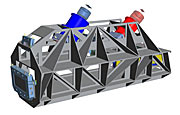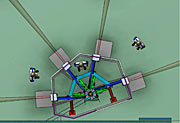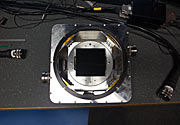Mitteilung
Die ESO vergibt Aufträge für die Kameras eines neuen Planetensuchers
7. August 2013
Die ESO hat die Verträge für die Konstruktion von zwei Kameras für das neue, leistungsstarke Planetenentdeckungs-Instrument ESPRESSO mit Winlight Systems (Frankreich) unterzeichnet.
ESPRESSO (Echelle Spectrograph for Rocky Exoplanet and Stable Spectroscopic Observations) ist ein hochstabiler Spektrograf, der 2016 im Paranal-Observatorium der ESO installiert werden wird. Er wird in der Lage sein das Licht von allen vier Einzelteleksopen des VLT (Very Large Telescope) zu vereinen und entspricht somit einem virtuellen 16-Meter Teleskop [1]. ESPRESSO wird von einem Zusammenschluss der ESO mit sieben weiteren wissenschaftlichen Instituten entwickelt:
- Centro de Astrofísica da Universidade do Porto (Portugal)
- Faculdade de Ciências da Universidade de Lisboa, CAAUL & LOLS (Portugal)
- INAF–Osservatorio Astronomico di Trieste (Italien)
- INAF–Osservatorio Astronomico di Brera (Italien)
- Instituto de Astrofísica de Canarias (Spanien)
- Physikalisches Institut der Universität Bern (Schweiz)
- Université de Genève (Schweiz)
ESPRESSO basiert auf dem extrem erfolgreichen High Accuracy Radial velocity Planet Searcher (HARPS) am 3,6-Meter Teleskop am La-Silla-Observatorium der ESO. ESPRESSO wird nicht nur von der in Kombination deutlich größeren Lichtsammelkapazität der vier 8,2-Meter Einzelteleksope des VLT profitieren, sondern auch von den Verbesserungen hinsichtlich der Stabilität und Kalibrationsgenauigkeit, die mittlerweile verfügbar sind (zum Beispiel die Laserfrequenzkamm-Technologie).
ESPRESSO wird den Astronomen ermöglichen, erdähnliche Planeten um nahe Sterne mit der Radialgeschwindigkeitsmethode zu entdecken [2]. Es wird außerdem viele andere wissenschaftliche Anwendungen haben, darunter die Suche nach möglichen Variationen von Naturkonstanten zu unterschiedlichen Zeiten und in verschiedenen Richtungen durch die Untersuchung des Lichts von sehr weit entfernten Quasaren.
Der Vertrag beinhaltet für die Bereitstellung von zwei refraktiven Kameras, wobei eine den roten und eine den blauen Teil des Spektrums abdeckt. Diese stellen zentrale Komponenten des Instruments dar. Die Nutzung von hoch nicht-sphärischen Oberflächen und neuen Bauprinzipien ermöglicht eine exzellente Bildqualität in einem weiten Bereich mit nur drei optischen Elementen.
Endnoten
[1] ESPRESSO wird das erste Instrument sein, das das Licht aller vier Einzelteleskope in einem inkohärenten Fokus kombiniert. Das PIONIER-Instrument hat die vier Strahlen bereits für interferometrische Untersuchungen vereint, allerdings lag hierbei eine kohärente Kombination vor (ann11021).
[2] Ein Planet, der sich in der Umlaufbahn eines Sternes befindet, erfährt eine kleine und regelmäßige Variation der Geschwindigkeitskomponente entlang der Sichtlinie (auch bekannt als Radialgeschwindigkeit) eines entfernten Beobachters auf der Erde. Diese Variation kann als „Taumelbewegung“ im Spektrum des Sterns wahrgenommen werden, da die Linien wegen des Dopplereffekts um ihre zentrale Position herum hin und her verschoben werden. Wenn der Planet sich vom Beobachter entfernt, bewirkt die Radialgeschwindigkeit eine Veränderung des Spektrums des Sterns in Richtung längerer Wellenlängen (sogenannte Rotverschiebung). Bei einer Bewegung auf den Beobachter zu findet hingegen eine Verschiebung zu kürzeren Wellenlängen (Blauverschiebung) statt. Diese sehr kleinen Verschiebungen im Spektrum eines Sterns, die mit Geschwindigkeiten von lediglich etwa 10 cm/s der von Geschwindigkeit von Schildkröten entsprechen, können mit einem hoch-präzisions Spektrografen wie ESPRESSO vermessen werden und lassen somit
Kontaktinformationen
Hans Dekker
ESPRESSO Instrumentation Engineer at ESO
Garching bei München, Germany
Tel: +49 89 3200 6268
E-Mail: hdekker@eso.org
Francesco Pepe
ESPRESSO Prime Investigator
Observatoire Astronomique de l'Université de Genève
Tel +41 22 379 23 96
E-Mail: Francesco.Pepe@unige.ch
Johannes Schimpelsberger
ESO, Contract Officer, Contracts and Procurement
Garching bei München
Tel: + 49 89 3200 6381
E-Mail: jschimpe@eso.org
Richard Hook
ESO, Public Information Officer
Garching bei München
Tel: +49 89 3200 6655
Mobil: +49 151 1537 3591
E-Mail: rhook@eso.org
Über die Mitteilung
| ID: | ann13065 |
Our use of Cookies
We use cookies that are essential for accessing our websites and using our services. We also use cookies to analyse, measure and improve our websites’ performance, to enable content sharing via social media and to display media content hosted on third-party platforms.
ESO Cookies Policy
The European Organisation for Astronomical Research in the Southern Hemisphere (ESO) is the pre-eminent intergovernmental science and technology organisation in astronomy. It carries out an ambitious programme focused on the design, construction and operation of powerful ground-based observing facilities for astronomy.
This Cookies Policy is intended to provide clarity by outlining the cookies used on the ESO public websites, their functions, the options you have for controlling them, and the ways you can contact us for additional details.
What are cookies?
Cookies are small pieces of data stored on your device by websites you visit. They serve various purposes, such as remembering login credentials and preferences and enhance your browsing experience.
Categories of cookies we use
Essential cookies (always active): These cookies are strictly necessary for the proper functioning of our website. Without these cookies, the website cannot operate correctly, and certain services, such as logging in or accessing secure areas, may not be available; because they are essential for the website’s operation, they cannot be disabled.
Functional Cookies: These cookies enhance your browsing experience by enabling additional features and personalization, such as remembering your preferences and settings. While not strictly necessary for the website to function, they improve usability and convenience; these cookies are only placed if you provide your consent.
Analytics cookies: These cookies collect information about how visitors interact with our website, such as which pages are visited most often and how users navigate the site. This data helps us improve website performance, optimize content, and enhance the user experience; these cookies are only placed if you provide your consent. We use the following analytics cookies.
Matomo Cookies:
This website uses Matomo (formerly Piwik), an open source software which enables the statistical analysis of website visits. Matomo uses cookies (text files) which are saved on your computer and which allow us to analyze how you use our website. The website user information generated by the cookies will only be saved on the servers of our IT Department. We use this information to analyze www.eso.org visits and to prepare reports on website activities. These data will not be disclosed to third parties.
On behalf of ESO, Matomo will use this information for the purpose of evaluating your use of the website, compiling reports on website activity and providing other services relating to website activity and internet usage.
Matomo cookies settings:
Additional Third-party cookies on ESO websites: some of our pages display content from external providers, e.g. YouTube.
Such third-party services are outside of ESO control and may, at any time, change their terms of service, use of cookies, etc.
YouTube: Some videos on the ESO website are embedded from ESO’s official YouTube channel. We have enabled YouTube’s privacy-enhanced mode, meaning that no cookies are set unless the user actively clicks on the video to play it. Additionally, in this mode, YouTube does not store any personally identifiable cookie data for embedded video playbacks. For more details, please refer to YouTube’s embedding videos information page.
Cookies can also be classified based on the following elements.
Regarding the domain, there are:
- First-party cookies, set by the website you are currently visiting. They are stored by the same domain that you are browsing and are used to enhance your experience on that site;
- Third-party cookies, set by a domain other than the one you are currently visiting.
As for their duration, cookies can be:
- Browser-session cookies, which are deleted when the user closes the browser;
- Stored cookies, which stay on the user's device for a predetermined period of time.
How to manage cookies
Cookie settings: You can modify your cookie choices for the ESO webpages at any time by clicking on the link Cookie settings at the bottom of any page.
In your browser: If you wish to delete cookies or instruct your browser to delete or block cookies by default, please visit the help pages of your browser:
Please be aware that if you delete or decline cookies, certain functionalities of our website may be not be available and your browsing experience may be affected.
You can set most browsers to prevent any cookies being placed on your device, but you may then have to manually adjust some preferences every time you visit a site/page. And some services and functionalities may not work properly at all (e.g. profile logging-in, shop check out).
Updates to the ESO Cookies Policy
The ESO Cookies Policy may be subject to future updates, which will be made available on this page.
Additional information
For any queries related to cookies, please contact: pdprATesoDOTorg.
As ESO public webpages are managed by our Department of Communication, your questions will be dealt with the support of the said Department.



